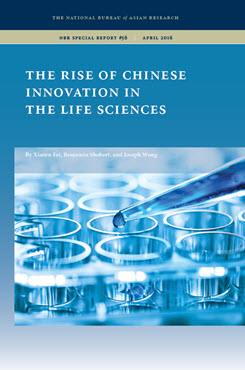Life Science Innovation in China
This essay examines China’s advances in the life science sector, discussing key aspects of China’s innovation ecosystem and the supportive role played by the government.
EXECUTIVE SUMMARY
MAIN ARGUMENT
China’s life science industry is rapidly catching up with those of Western countries. Although Chinese capacities still lag behind other industry leaders, recent efforts in biotechnology ensure that the country will become a key player in the global life science industry. China’s main advantage is its size and scale. This is evident, for instance, in the large number of science and technology personnel in China, as well as the scale of R&D investment from both public and private sources. The government plays an important supporting role, primarily to mitigate the risks and uncertainties of life science innovation. Chinese policymakers have also strategically exploited their country’s distinct advantages, notably through developing firms and organizations capable of plugging into global networks and life science value chains, recruiting overseas talent, and leveraging the promise and size of the Chinese market.
POLICY IMPLICATIONS
- Although its near-term outlook is positive, China’s life science sector does not pose an immediate or even medium-term challenge to existing global biotech leaders.
- The general trajectory of Chinese reforms is not toward a more interventionist developmental state but rather toward a state that is more distant from the direct administration of the field. Reforms appear to favor market and nongovernmental institutions and to streamline the state apparatus.
- For the Chinese life science industry to become commercially viable, stakeholders in China must address the following three policy challenges: (1) develop technology transfer mechanisms that transform basic research into commercial products and processes, (2) reform the regulatory system to encourage the growth of consumer markets and the strengthening of consumer safety regulations, and (3) continue to collaborate with global innovation networks in the life science field.
Joseph Wong is the Ralph and Roz Halbert Professor of Innovation in the Munk School of Global Affairs at the University of Toronto, where he is also Professor and Canada Research Chair in Political Science.
Xiaoru Fei is a Research Fellow at the Innovation Policy Lab in the Munk School of Global Affairs at the University of Toronto.



